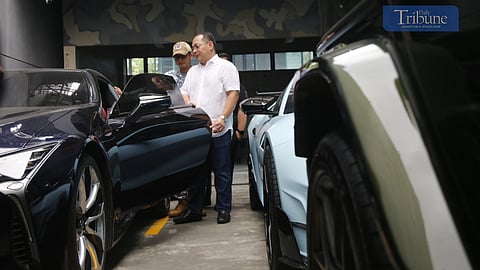
- NEWS
- the EDIT
- COMMENTARY
- BUSINESS
- LIFE
- SHOW
- ACTION
- GLOBAL GOALS
- SNAPS
- DYARYO TIRADA
- MORE

The Bureau of Customs (BOC) is urging owners or claimants of imported goods covered by Letters of Authority (LOA) to settle the correct duties and taxes through voluntary payment rather than facing a Warrant of Seizure and Detention (WSD).
Section 224 of the Customs Modernization and Tariff Act (CMTA) allows owners or claimants to exercise this option within 15 days from the implementation of the LOA. BOC Commissioner Bien Rubio stated that voluntary payment will spare both the government and concerned parties from the complicated and lengthy process of Warrant of Seizure and Detention (WSD) proceedings, while the imported goods remain held and exposed to government forfeiture.
Rubio cited Section 5 of Customs Administrative Order (CAO) 10-2020, which allows the immediate release of goods once proof of payment for the correct duties and taxes is presented, along with proof of local purchase by the owner or claimant.
“If the claimant cannot produce proof of payment for the correct duties and taxes by the original importer, despite diligent efforts, they may voluntarily offer to pay the duties and taxes due on the imported items,” Rubio said.
“This is available to claimants who can prove that they are bonafide purchaser of the imported goods,” the commissioner added.
The BOC chief issued this notice amid recent enforcement operations, which led to the seizure of ₱2.8 billion worth of high-end vehicles, including luxury brands such as Ferrari, Porsche, and McLaren, from warehouses in Makati, Taguig, Parañaque, and Pasay this month.
Agents from the Customs Intelligence and Investigation Service (CIIS) visited a luxury car seller’s registered address to serve an LOA to the shop owner or representative.
The owners, lessees, lessors, occupants, and representatives of the warehouses and vehicles have 15 days from receiving the LOA to submit the necessary documents proving that all customs duties and taxes have been correctly paid.
“Registered owners of imported vehicles who can prove that they are bonafide purchasers must settle the customs duties and taxes within the 15-day period,” said Rubio.
To reclaim a seized vehicle, the registered owner must provide substantial evidence that their luxury car was purchased locally, that they did not participate in its importation, and that they were unaware of any deficiencies in the original importer’s payment of customs duties and taxes.
Failure to provide valid documentation will result in charges for violating the Customs Modernization and Tariff Act.
Deputy Commissioner for Intelligence Group Juvymax Uy said the voluntary payment option aims to increase tax revenues for the government while protecting the interests of innocent parties.
"This proactive approach will empower the Bureau to significantly bolster its revenue collection efforts while effectively safeguarding seized goods from deterioration pending seizure and forfeiture proceedings," he said.
